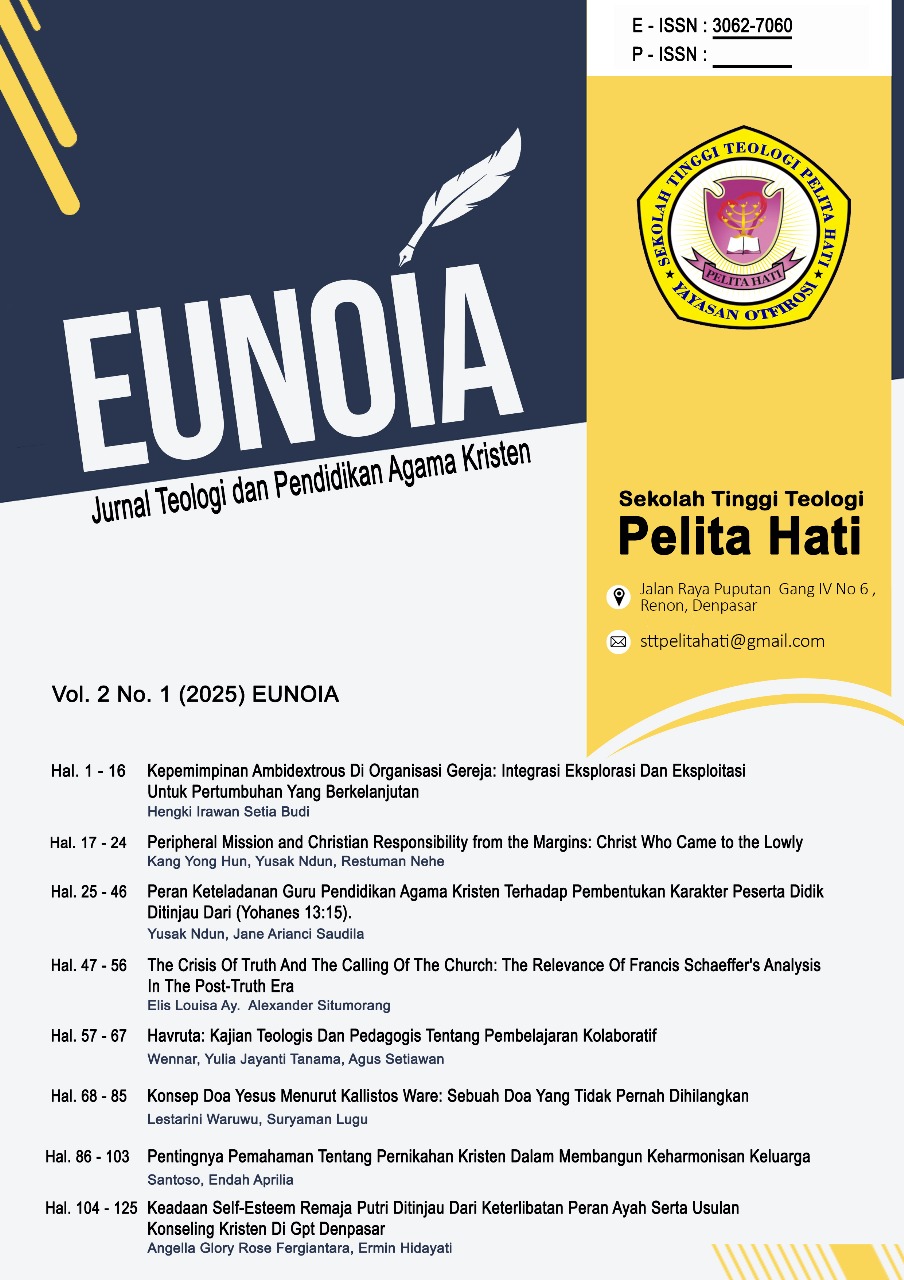THE CRISIS OF TRUTH AND THE CALLING OF THE CHURCH: THE RELEVANCE OF FRANCIS SCHAEFFER'S ANALYSIS IN THE POST-TRUTH ERA
Kata Kunci:
Post-Truth Era, Francis Schaeffer, Objective Truth, Curch and Cuture, ApologeticsAbstrak
Abstract: The contemporary world is experiencing a crisis of truth, characterized by the dominance of emotions, personal beliefs, and ideological narratives over objective facts and moral absolutes. This phenomenon, known as the post-truth era, has significant ethical, social, and theological implications, particularly for the Christian Church. Francis Schaeffer, a prophetic evangelical thinker of the twentieth century, provided a penetrating analysis of Western culture's departure from absolute truth in his seminal work, "The God Who Is There." Schaeffer warned that the rejection of transcendent, divinely revealed truth would inevitably lead to moral relativism, societal disintegration, and the collapse of meaningful communication. This paper critically examines Schaeffer’s analysis in light of contemporary post-truth dynamics and explores the Church's theological and prophetic responsibility in responding to this cultural crisis. The study argues that Schaeffer’s call for the Church to reclaim its commitment to biblical truth, cultivate intellectual discernment, and courageously confront cultural falsehood remains profoundly relevant today. By engaging both theology and public discourse, the Church is challenged to be a countercultural community that bears witness to the truth of the Gospel amidst a society increasingly indifferent to facts and moral objectivity.
Referensi
Bateza, Anthony M. “Truth Telling in a Post- Truth World by D. Stephen Long.” Journal of the Society of Christian Ethics 42, no. 1 (2022): 225–26.
Carpenter, Joel. “Reawakening Evangelical Intellectual Life: A Christian Scholar’s Review.” Christian Scholar’s Review 51, no. 2 (2022): 127–51.
Creswell, John W. Qualitative Inquiry & Research Design: Choosing Among Five Approaches. 4th Ed. Thousand Oaks CA: SAGE Publications, 2018.
Creswell, John W, and V L Plano Clark. “Revisiting Mixed Methods Research Designs Twenty Years Later.” Handbook of Mixed Methods Research Designs 1, no. 1 (2023): 21–36.
Ecker, Ullrich K H, Jon Roozenbeek, Sander van der Linden, Li Qian Tay, John Cook, Naomi Oreskes, and Stephan Lewandowsky. “The Truth Is Misinformation Remains a Threat,” n.d.
Ejue, Olympus G, and Daniel Sunday Etim. “Post-Truth Society and the Social Media in The 21st Century.” Creative Artist: A Journal of Theatre and Media Studies 18, no. 1 (2024): 75–88.
Friedman, Jeffrey. “Post-Truth and the Epistemological Crisis.” Critical Review. Taylor & Francis, 2023.
Hannon, Michael. “The Politics of Post-Truth.” Critical Review 35, no. 1–2 (2023): 40–62. Hunter, James Davison. To Change The World: The Irony, Tragedy, and Possibility of Christianity in The Late Modern World.
Oxford, England: Oxford University Press, 2010.
Lawrence A. Machi and Brenda T. McEvoy. The Literature Review: Six Steps to Success, 3rd Ed. Thousand Oaks CA: Corwin Press, 2016.
Lyotard, Jean-Francois. The Postmodern Condition: A Report on Knowledge, 1979.
Malcolm, Dominic. “Post-Truth Society? An Eliasian Sociological Analysis of Knowledge in the 21st Century.” Sociology 55, no. 6 (2021): 1063–79.
Moravčíková, Erika. “Media Manipulation and Propaganda in the Post-Truth Era.” Media Literacy and Academic Research 3, no. 2 (2020): 23–37.
Munroe, Wade. “Echo Chambers, Polarization, and ‘Post-Truth’: In Search of a Connection.” Philosophical Psychology 37, no. 8 (2024): 2647–78.
Polidoro, Piero. “Post-Truth and Fake News. Preliminary Considerations.” Versus 47, no. 2 (2018): 189–206.
Schaeffer, Francis A. Escape From Reason. Downer grove,IL: InterVarsity Press, 1968.
———. He Is There and He Is Not Silent. Wheaton, IL: Tyndale House Publisher, 2001.
———. The God Who Is There. Downer grove,IL: InterVarsity Press, 1968.
Schaeffer, Francis August. How Should We Then Live? The Rise and The Decline of Western Thought and Culture. Wheaton,









